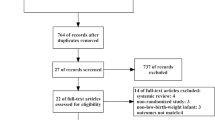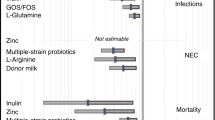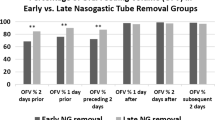Abstract
Objectives:
To evaluate the effectiveness of low-dose oral erythromycin to treat feeding intolerance in preterm infants.
Design:
This study was a prospective, double-blind, randomized, placebo-controlled trial on 60 premature infants suffering from feeding intolerance. Thirty infants were given oral erythromycin 1 mg/kg every 8 h and 30 infants were given placebo (normal saline). Randomization was stratified on enrollment according to gestational age whether >32 weeks or ⩽32 weeks. The primary end point was the length of time taken to establish full enteral feeding since enrollment. Potential adverse effects associated with erythromycin were also monitored. Groups of each corresponding stratum were compared using two-tail t-test and Mann–Whitney for continuous variables, and χ2 and Fisher's exact for categorical variables.
Results:
For infants with gestational age >32 weeks, the erythromycin group achieved full enteral feeding earlier than placebo group (10.5±4.1 vs 16.3±5.7 days, respectively; P=0.01) had fewer episodes of gastric residuals (P<0.05) and shorter duration of parenteral nutrition (PN) (P<0.05). On the other hand, in infants with gestational age ⩽32 weeks, there were no significant differences between erythromycin and placebo groups regarding any of these variables.
Conclusion:
Low-dose enteral erythromycin is associated with better tolerance of feeding and shorter duration of PN in infants >32 weeks gestation. A similar effect on younger preterm infants was not demonstrable.
This is a preview of subscription content, access via your institution
Access options
Subscribe to this journal
Receive 12 print issues and online access
$259.00 per year
only $21.58 per issue
Buy this article
- Purchase on Springer Link
- Instant access to full article PDF
Prices may be subject to local taxes which are calculated during checkout
Similar content being viewed by others
References
Ng PC, So KW, Fung KSC, Lee CH, Fok TF, Wong E et al. Randomized controlled study of oral erythromycin for treatment of gastrointestinal dysmotility in preterm infants. Arch Dis Child Fetal Neonatal Ed 2001; 84: F177–F182.
Barnett CP, Omari T, Davidson GP, Goodchild L, Lontis R, Dent J et al. Effect of cisapride on gastric emptying in premature infants with feed intolerance. J Pediatr Child Health 2001; 37: 559–563.
Su BH, Lin HC, Peng CT, Tsai CH . Effect of erythromycin on feeding intolerance in very low birth weight infants: a preliminary observation. Acta Pediatr Sin 1998; 39: 324–326.
Aanpreung P, Vajaradul C . Clinical use of erythromycin in children with gastrointestinal dysmotility. J Med Assoc Thai 2001; 84: 1021–1026.
Kubota M, Nakamura T, Motokura T, Mori S, Nishida A . Erythromycin improves gastrointestinal motility in extremely low birth weight infants. Acta Paediatr Jpn 1994; 36: 198–201.
Berne JD, Norwood SH, McAuley CE, Vallina VL, Villareal D, Weston J et al. Erythromycin reduces delayed gastric emptying in critically ill trauma patients: a randomized, controlled trial. J Trauma 2002; 53: 422–425.
Patole S, Rao S, Doherty D . Erythromycin as a prokinetic agent in preterm neonates: a systematic review. Arch Dis Child Fetal Neonatal Ed 2005; 90: 301–306.
Ballard J, Khoury JC, Wedig K, Wang L, Eilers-Walsman BL, Lipp R . New Ballard Score, expanded to include extremely premature infants. J Pediatr 1991; 119: 417–423.
Costalos C, Gounaris A, Varhalama E, Kokori F, Alexiou N, Kolovou E . Erythromycin as a prokinetic agent in preterm infants. J pedaitr Gastroenterol Nutr 2002; 34: 23–25.
Nogami K, Nishikubo T, Minowa H, Uchida Y, Kamitsuji H, Takahashi Y . Intravenous low-dose erythromycin administration for infants with feeding intolerance. Pediatr Int 2001; 43: 605–610.
Parkman H, Pagano AP, Vozzelli MA, Ryan JP . Gastrokinetic effects of erythromycin: myogenic and neurogenic mechanisms of action in rabbit stomach. Am J Physiol 1995; 269: G418–G426.
Otterson M, Sarna SK . Gastrointestinal motor effects of erythromycin. Am J Physiol 1990; 259: G355–G363.
Janssens J, Peeters TL, Vantrappen G, Tack J, Urbain JL, De Roo M et al. Improvement of gastric emptying in diabetic gastroparesis by erythromycin. Preliminary studies. Engl J Med 1990; 322: 1028–1031.
Bruley des Varannes S, Parys V, Ropert A, Chayvialle JA, Roze C, Galmiche JP . Erythromycin enhances fasting and postprandial proximal gastric tone in humans. Gastroenterology 1995; 109: 32–39.
Fraser R, Shearer T, Fuller J, Horowitz M, Dent J . Intravenous erythromycin overcomes small intestinal feedback on antral, pyloric, and duodenal motility. Gastroenterology 1992; 103: 114–119.
Jadcherla SR, Berseth CL . Effect of erythromycin on gastroduodenal contractile activity in developing neonates. J Pediatr Gastroenterol Nutr 2002; 34: 16–22.
Orenstein S . Erythromycin and gastroduodenal contractile activity. Curr Gastroenterol Rep 2002; 4: 227–228.
Tomomasa T, Miyazaki M, Koizumi T, Kuroume T . Erythromycin increases gastric antral motility in human premature infants. Biol Neonate 1993; 63: 349–352.
Dellagrammaticas HD, Iacovidou N, Megaloyanni E, Papadimitriou M, Kapetanakis J . Effect of low-dose oral erythromycin on gastric aspirates in ventilated neonates less than 32 weeks of gestation. Preliminary results. Biol Neonate 2002; 81: 213–216.
Author information
Authors and Affiliations
Corresponding author
Rights and permissions
About this article
Cite this article
Aly, H., Abdel-Hady, H., Khashaba, M. et al. Erythromycin and feeding intolerance in premature infants: a randomized trial. J Perinatol 27, 39–43 (2007). https://doi.org/10.1038/sj.jp.7211618
Received:
Revised:
Accepted:
Published:
Issue Date:
DOI: https://doi.org/10.1038/sj.jp.7211618
Keywords
This article is cited by
-
Macrolides for the prevention and treatment of feeding intolerance in preterm low birth weight infants: a systematic review and meta-analysis
European Journal of Pediatrics (2021)
-
A controlled trial of erythromycin and UDCA in premature infants during parenteral nutrition in minimizing feeding intolerance and liver function abnormalities
Journal of Perinatology (2012)



